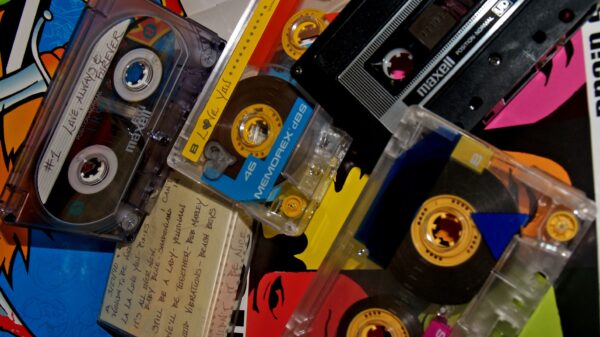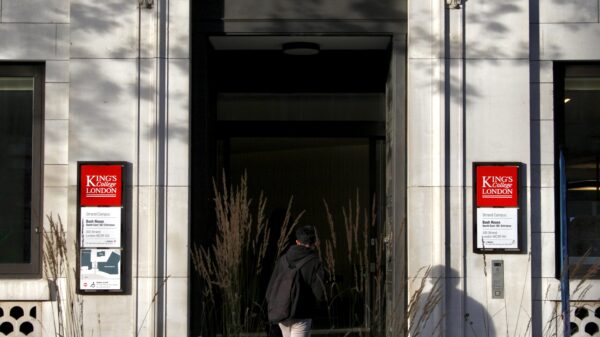Rewinding to 1989, the BBC/Binge Original Series ‘Mix Tape’ tells the story of Daniel O’Toole, a passionate Music enthusiast, as heartbroken because his first love, Alison Connor, leaves their home of Sheffield to Sydney, Australia. Many years later, through their shared love of music, they reconnect.
Music taste may be subjective, but for generations it has bound people together. It unites emotions, experiences and expressions. The music scene continually transforms, decade after decade. No matter the transformation it undergoes, its power to connect remains. ‘Mix Tape‘ explores this idea, and takes us on a journey through musical history.
The four part miniseries adapts Jane Sanderson’s book ‘Mix Tape’, following the characters of Alison (Florence Hunt; Teresa Palmer) and Daniel (Rory Walton-Smith; Jim Sturgess), as they fall in love with each other and music. Regardless of financial struggles and personal difficulties, we watch the characters find sanctuary through their musical memories. Inevitably rekindling old flames. After all, “You never forget the boy who makes you your first mixtape”.
Their journey begins in meeting at a house party. From there, we see them meet in and outside of school, engage in conversations and swap mixtapes. Curating a collection of songs on a cassette is a significant expression of love and admiration. It’s a tangible and physical translation of emotion. Physical media, such cassettes, vinyl records and CDs, is still one of the music industry’s greatest sensations.
The generation that Daniel and Alison serve to represent, likely bought physical forms of Music (as we witness Daniel’s own record collection). However, there is a revival among younger generations. According to Now Spinning Magazine, 76% of 18-25 year-olds buy vinyl records and 80% own a record player. It connects generations and builds communities.
Sadly, making a mixtape or burning a CD seems to have become a dying art. The modern equivalent, perhaps, is the curation of a digital playlist. Even though the compilation isn’t tactile, the memories attached are.
In ‘Mix Tape’, Alison progresses as a bestselling Novelist, whereas, Daniel becomes a freelance Music Journalist for Rolling Stones Magazine. Both characters channel their experiences over the years into their careers – one being Alison’s working-class background. Symbolically, her class struggle encapsulates the lives of other young girls from the latter of Thatcherism. Like many, she uses Music as her escapism from class-struggles. Mentioning artists like David Bowie, The Cure and New Order.
However, whilst not explicitly mentioned in the series nor the book, it is important to note the role of music as a megaphone for these struggles. From this era specifically, we see songs such as A Town Called Malice by The Jam and Ghost Town by The Specials debut. It would have been interesting to see these didactic songs feature in the series, to aid in deepening the historical context because they feature themes such as socio-economic hardship, discontent and isolation.
Throughout the series we do watch Alison experience shame and exclusion due to her background. For example, through Daniel’s Mother Marian (Helen Behan). As an anxious Mother, she alienates Alison in numerous cases. She questions why Alison is always visiting their home, eating their food while Daniel never receives the same treatment. Insinuating, that she is inadequate for her son. Potentially blinded by motherly instincts, these are serious signs of fiscal struggle that are ignored. As a consequence, Alison carries this shame into adulthood. Unfortunately, like some have done, and many do. Perhaps this is a wake-up call on the impact of class divisions.
Currently, we’ve seen musicians like the Arctic Monkeys rise from their working-class background. Like the characters of Alison and Daniel, most of the band members grew up in the Surburbs of Sheffield. Their song Fluorescent Adolescent, a song about nostalgia and youth, appears in the first episode of the mini series. Yes, the song stands for the characters’ memories of youthfulness in Sheffield. Yet it is also symbolic of Alison’s transition from a working background to prosperity – like the band members. Both the characters and the band “Land in a very common crisis“ growing up in a Northern city, surrounded by collective fiscal struggle. As Alison settles in Australia, it proves escape from her class “common crisis” is possible. However, she cannot evade the memories of her youth.
Perchance, the use of the dual timeline emphasises Alison’s transformation away from Sheffield. Instinctively, the use of a dual timeline appears as confusing, sporadic and unintended. However, as ‘Mix Tape’ unfolds, Alison and Daniel reveal secrets about themselves and acknowledge why they lost contact. Both the past and the present jointly offer answers to these questions viewers may have. It builds up tension, reflects on mistakes and miscommunication.
Both Daniel and Alison were married and had children by the time they reconnect. Nevertheless, the unresolved feelings to the possibility of finding closure, the dual timeline serves the purpose of bringing the characters together again. Interconnecting past decisions to present consequences. These ‘time-shifts’ were meticulously designed to show greater depth in Daniel and Alison’s relationship. Proving, that teenage relationships hold precious, unforgettable, momentous memories.
‘Mix Tape’ reminds us the importance of our past. The choices we make and the people we meet are the stepping stones for how we grow up and develop relationships with others. The characters of Alison and Daniel are well-crafted to illustrate that actions do have consequences.
Walking away from the series, it creates a sense of reminiscence about past decisions, memories and experiences. Importantly, how the melodies, lyrics and harmonies listened to in Music, keep these memories alive.

















